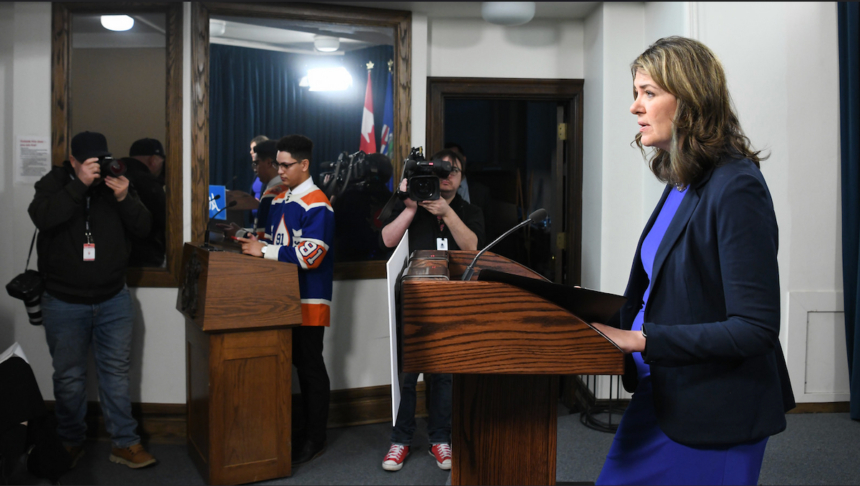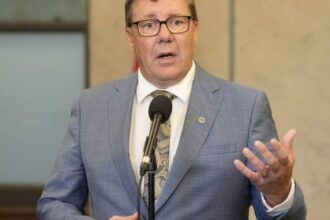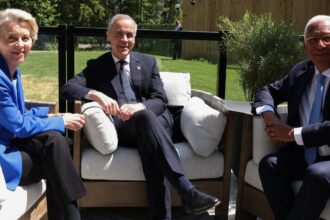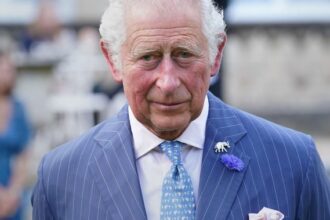In a tense press conference yesterday, Alberta Premier Danielle Smith attempted to distance herself from her previous advocacy for provincial independence, as journalists pressed for clarity on her government’s sovereignty ambitions. The premier’s visible discomfort highlighted the political tightrope she now walks between appeasing her United Conservative Party’s separatist faction and reassuring mainstream Albertans concerned about national unity.
“Let me be absolutely clear: I am not pursuing independence for Alberta,” Smith declared, her voice firm but her body language revealing underlying tension. This statement comes after years of the premier’s documented support for what she once termed “necessary separation” should Ottawa continue policies she viewed as harmful to Alberta’s economic interests.
The controversy stems from Smith’s leadership of the Wildrose Independence Party and her numerous public statements supporting Alberta’s potential exit from confederation. Between 2018 and 2021, Smith repeatedly advocated for Alberta to seek sovereignty if federal energy and environmental policies remained unchanged. Her infamous 2019 editorial, published in the Calgary Herald, explicitly stated: “Alberta must prepare independence options as leverage against Ottawa’s overreach.”
Political analyst Dr. Margaret Chen from the University of Calgary notes this represents a significant political liability. “The premier is attempting to rewrite her political history,” Chen explained. “Voters have long memories, and the extensive record of her separatist rhetoric presents a challenge to her current narrative of commitment to Canadian federalism.”
Smith’s approach to federal relations has raised concerns even among traditional conservative supporters. The Alberta Sovereignty Act, her government’s signature legislation, has been criticized by constitutional experts as potentially illegal and certainly destabilizing to federal-provincial relations. Former Progressive Conservative cabinet minister Richard Morton has publicly questioned whether the legislation is merely “separation through the back door.”
The economic implications of Smith’s sovereignty rhetoric have already manifested in tangible ways. Investment analysts at Royal Bank of Canada recently cited “political uncertainty and sovereignty concerns” as factors in their downgraded outlook for Alberta’s energy sector. The Canadian Chamber of Commerce has similarly warned that constitutional brinkmanship creates an unstable business environment.
When confronted with direct questions about her previous statements, Smith attempted to pivot to criticisms of federal policy, particularly carbon pricing. “What Albertans want is a fair deal within confederation,” she insisted, though the resulting murmurs in the press room suggested journalists remained skeptical.
The premier’s struggle to reconcile her past with her present position reflects broader tensions within Alberta’s conservative movement, where populist anti-Ottawa sentiment must be balanced against the practical realities of governance and economic stability. Recent polling from Angus Reid indicates only 23% of Albertans support separation, though frustration with federal policies remains high.
As the 2023 provincial election approaches, Smith’s opponents are already compiling her previous statements on independence. NDP leader Rachel Notley has described Smith’s sovereignty agenda as “dangerous and destabilizing,” promising Albertans a return to “responsible governance within confederation.”
The question now facing Alberta voters goes beyond policy disagreements to fundamental issues of national identity: Can a premier who has repeatedly advocated for provincial independence be trusted to negotiate in good faith within the federal system? Or does Smith’s sovereignty agenda represent a genuine threat to Canadian unity at a time when global instability demands national cohesion?











